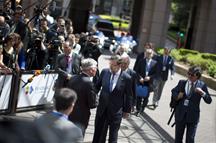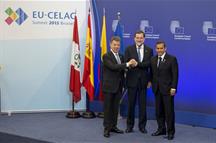Mariano Rajoy announces there will be changes in the government this month
President's News - 2015.6.10
1. Images of President Rajoy at 2nd EU-CLACS Summit (Community of Latin American and Caribbean States)2015.6.10
Brussels (Belgium)
In a statement to the media on his arrival at the Summit, Mariano Rajoy said that the changes in the Government he himself announced would take place "before the end of the month". He also recalled that the appointment of ministers is the exclusive responsibility of the President of the Government, as is the dissolution of Parliament.
With respect to the date on which the general elections would be held, he said that no decision had been taken, and stressed that "we are in a period of recovery that has to be taken advantage of."
The President of the Government pointed out that recent months had been very favourable to job creation and numbers of contributors to the Social Security system, and he hoped that June would be too, "but there are a great many people who still do not have a job," he said. "There is time in this term of office to continue doing things and to take advantage of the fact that the measures adopted so far are beginning to give results," he added. Calling early elections, he added, only makes sense "for a purely technical reason or because government is not possible because of a lack of support."
The list most voted for should govern
 Pool MoncloaAsked about the agreements being made following the recent elections, the President of the Government showed himself in favour of the party winning most votes governing, "except in some exceptional cases."
Pool MoncloaAsked about the agreements being made following the recent elections, the President of the Government showed himself in favour of the party winning most votes governing, "except in some exceptional cases."
In his opinion, if, in the region of Andalusia, the idea that the list most voted for should govern has been accepted positively, it would be good that this should happen in the local councils as well. "What makes no sense is that in some places the list most voted for governs and in others it doesn't," he said.
Mariano Rajoy added that he is in favour of pacts to the extent that "they can lead to stable governments with shared programmes." He expressed his concern over the agreements that are being reached in the three main cities of Spain. "At the present time, Spain needs stability, security, certainty and hard work so that economic recovery and job creation can take hold," he stressed.
EU-CLACS Summit
The President of the Government explained that at the 2nd EU-CELAC summit, held in Brussels over two days, an agreement would be drawn up at Spain's initiative between the European Union, Colombia and Peru so that the citizens of these countries can make short trips to the European Union without the need for visas. He also confirmed that the Government is working on the application of the same system to the citizens of Ecuador.
 Pool MoncloaThe meeting also dealt with the possibility that the countries in the Southern Cone region of South America could join the Southern Common Market (Mercosur), of which Argentina, Brazil, Uruguay and Venezuela already form part. Mariano Rajoy explained he talked about this issue yesterday with the President of the Republic of Paraguay during the talks the two had at Moncloa Palace.
Pool MoncloaThe meeting also dealt with the possibility that the countries in the Southern Cone region of South America could join the Southern Common Market (Mercosur), of which Argentina, Brazil, Uruguay and Venezuela already form part. Mariano Rajoy explained he talked about this issue yesterday with the President of the Republic of Paraguay during the talks the two had at Moncloa Palace.
He also gave notice that one of Spain's important objectives is to extend and strengthen political, trade, cooperation and investment agreements with Mexico and Chile.
The President of the Government explained the importance of the Summit for bringing Latin America and the Caribbean closer to Europe: "We should not forget that they are two regions in the world with shared values, principles and many trading and investment relations."
Presidency of the Eurogroup
On a different note, Mariano Rajoy repeated his support for the Minister of Economic Affairs and Competition, Luis de Guindos, as candidate for presidency of the Eurogroup, because he is "very good" and because Spain has the right to this post "because of our size and our gross domestic product." In addition, he noted that in 2012 Spain was called the "weak man of Europe", and now after the "great effort" made by the Spanish people, it has become the country with the fastest growth.
"When a country is capable of making progress, of moving forward, of overcoming situations of enormous difficulty - though we still have many things to do - this also has to be taken into account and gives legitimacy to the presentation of our candidature to the presidency of the Eurogroup. We are going to present it and we will maintain it, and then it will be up to whoever has to decide to do so," he concluded.
Boosting bi-regional relations
In his speech at the first work session of the summit, Mariano Rajoy called for a boost to relations between the European Union and countries in Latin America and the Caribbean aimed at improving the lives of citizens in the two regions. "The world in which we live is moving along a path of gradual integration. There are those who would try and delay this process but they face an irresistible force", he said.
To continue making progress along that path, the President of the Government called for the conclusion of negotiations with MERCOSUR, further development of the Partnership Agreements with Chile and Mexico, and the signing of an Agreement with Ecuador. Mariano Rajoy stressed that the European Union is the second-largest trade partner and the leading foreign investor in the CLACS regions. "We must also make an effort to attract more investment in Europe from our American partners and generate innovative cooperation formulas capable of overcoming traditional approaches to this topic", he said. He also encouraged political dialogue and reaching agreements on global challenges such as the fight against climate change and organised crime.
The President of the Government of Spain went on to highlight the "key political processes" that are taking place in Latin America. In this regard, he expressed "firm and decisive support" for the Government and people of Colombia in the peace process in the country and said that "the current negotiations for an agreement between the European Union and Cuba represent a turning point of far-reaching significance within the context of updating relations between Cuba and the rest of the world".





